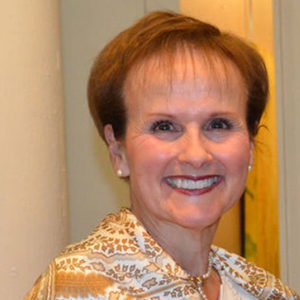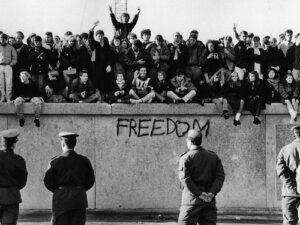Arriving at the Cam Ranh Bay airport in 1968 was an exciting moment for Captain Linda Sharp. She would be returning home in time for Christmas, but her mood shifted as she boarded the C-141 military plane. She sat in a jump seat while facing racks loaded from top to bottom with caskets of American servicemen. It was a sobering reminder of the price of war.
Today, Linda Sharp Caldwell lives in Aiken, South Carolina with her husband Brent, but she grew up around the country as a military “brat.” Her father was a career Air Force officer who served in World War II.
When asked how she ended up in Vietnam, Linda smiles and says, “I volunteered!” While attending the University of San Francisco, she learned that if she would make a three-year military commitment to the United States Army or Navy, they would pay for her nursing degree and give her a monthly stipend while in college. She opted to join the United States Army.
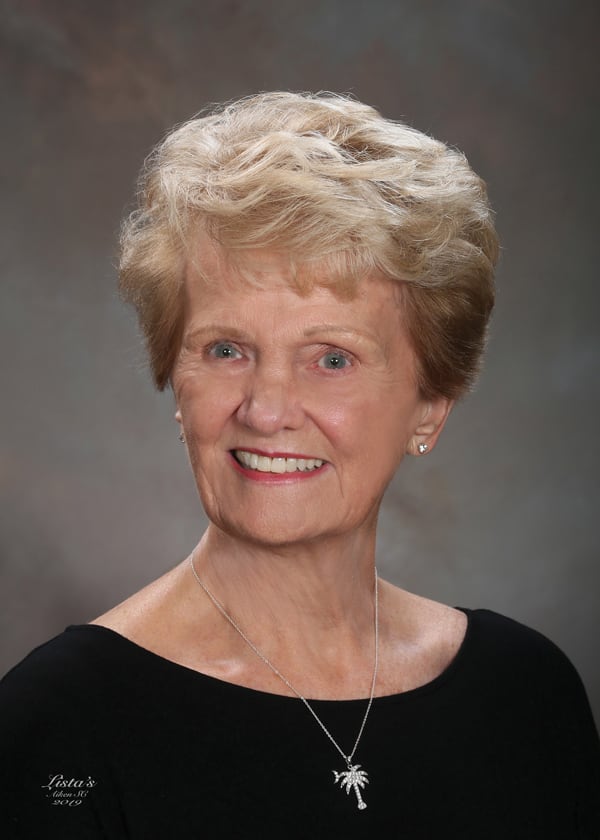
Linda Sharp Caldwell today.
After completing basic training, Linda was sent to Walter Reed Hospital in Washington DC. She was initially assigned to the female medicine ward but she didn’t feel sufficiently challenged. She said, “When I changed to the male neurosurgery ward, I worked with Vietnam veterans. I decided I wanted to go to Vietnam.”
In November 1967, Linda arrived at the military hospital at the Qui Nhon Airfield. A former Air Force barracks, the building had been converted into a makeshift hospital. It was there that Linda worked in a 72-bed ward, where she tended to patients who suffered from loss of limbs and neurological trauma. At times she even had enemy patients in her ward, with their armed guards.
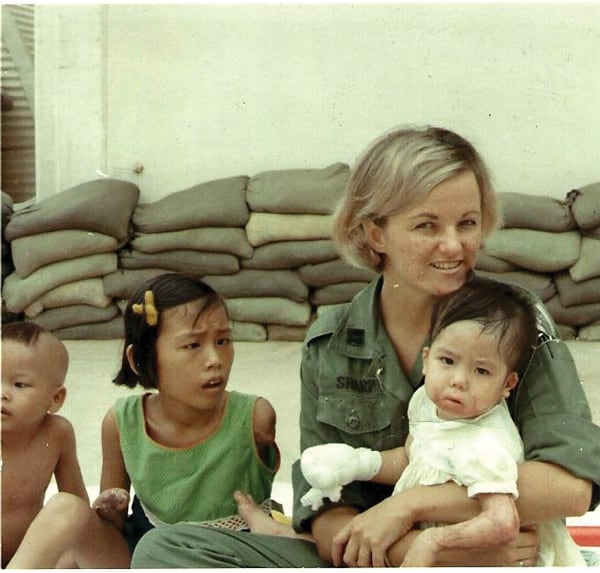
When time allowed, Captain Sharp provided medical assistance to local children.
She said, “We worked 12-hour shifts, six days a week. It was a bare bones facility where we kept patients for five days until they were ready to be shipped out to a military hospital in Japan or the Philippines.” She said the work was physically hard during her 13-month tour of duty, but it was also mentally difficult. It was heart wrenching to see the wounded young men missing body parts and think about their future.
It was in Vietnam that Linda acquired skills you wouldn’t expect from a nurse. Linda said, “I was taught to suture by a surgeon. Wounds from the field were contaminated so it took several days to clean them to avoid infection. I had a list of all the patients with open wounds, and on the fifth day, I sutured them closed to prepare them for transport.”
Linda’s hospital was in the zone targeted by the North Vietnamese during the bloody Tet Offensive, which began in January 1968. During the enemy attacks that lasted 26 days, Linda and her peers tended to their patients by candlelight to avoid bringing attention to the hospital during the raids. It was a brutal time — the United States death toll in Vietnam increased to more than 500 per week, and many more were injured.
When asked about her parents, Linda said, “The hardest part of my time in Vietnam was being away from my family. We would exchange tape recordings, but the communications were nothing like it is today. Letters and tapes were all we had.” As for her parents’ feelings about her volunteering for Vietnam, she said, “My mother was horrified, but I think my father was very proud.”
Linda is quick to point out that, even in war, there were good times. If the weather was nice on her day off, there were occasional trips to the official Rest & Recreation (in-county R&R army-controlled) beach near the hospital. There were impromptu gatherings among the medical personnel during the infrequent quiet times when they could talk and play card games.
Linda did have somewhat limited interaction with the local South Vietnamese. She went to the villages and orphanages with an interpreter and a corpsman. It was there that they distributed drugs to address the rampant problem of intestinal worms. She also had several Vietnamese children as orthopedic ward patients, all with wounds from non-military situations.
When Linda returned stateside, she completed her military obligations. She met a handsome Air Force Captain, Brent Caldwell. They married and she pursued her master’s degree. Together they raised three beautiful daughters. Linda pursued work in the oncology field, eventually working with a pharmaceutical company.
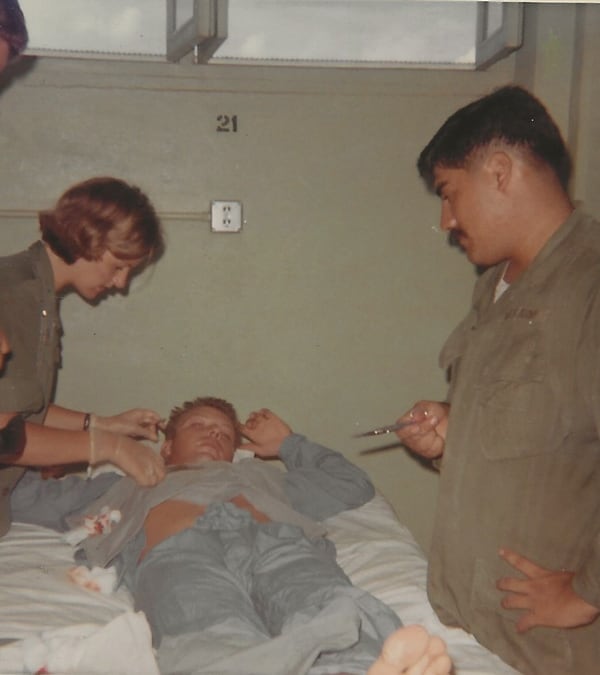
Captain Sharp, assisted by a corpsman, sutures her patient.
In 1990, Linda was contacted by the television producers of Unsolved Mysteries. The producers had put the word out that if any Vietnam veteran wanted to thank his or her nurse in person, the show would try to connect them. Jim Baczkowski was one of the two veterans selected, and he wanted to see Captain Linda Sharp one more time.
Linda flew to Jim’s Colorado home for the taping of their reunion. Jim had been 19 years old when he lost his leg in Vietnam. While caring for him, Linda encouraged him to write a letter to his bride of five months. Linda wrote one to the young wife as well, telling her to be patient and supportive of him when he returned home. Jim and his wife kept both letters and a picture he took of Linda. They wanted to thank Linda personally for helping them.
One of Linda’s happiest memories is having her family join her at the dedication of the Vietnam Women’s Memorial in Washington DC. It is a fitting tribute for the nearly 11,000 American women who served in the Vietnam war. While she, Brent, and their three daughters were awaiting the ceremony, Linda saw a banner in the distance. It read “67th Evac Hospital,” otherwise known as the military hospital at the Qui Nhon Airfield. There she reconnected with nurses she hadn’t seen since she left Vietnam.
Today, Linda is very active in a number of veterans’ organizations, including the Aiken County Veterans Council and the SC Veteran Coalition. She is passionate about making sure veterans have the services they need and are remembered for their service and their sacrifices.
Individuals who wear a uniform realize they may have to go to war one day. This noble deed is the ultimate price of peace. Thank you, Linda Caldwell nee Captain Linda Sharp, for your service. May no veteran’s sacrifice ever be forgotten.

